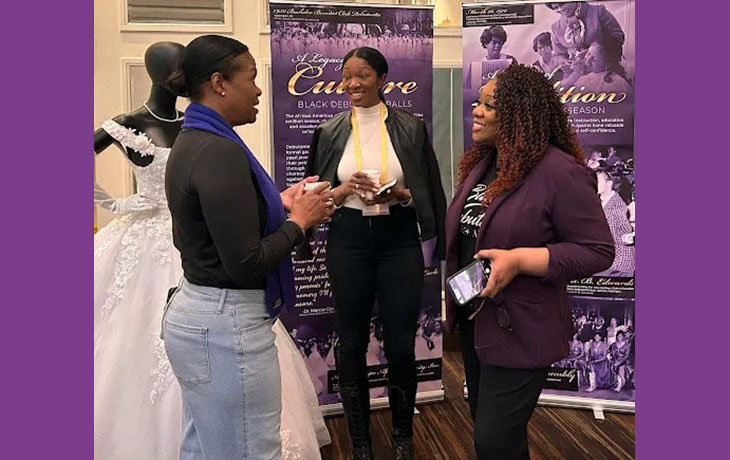Black Cotillions: Resistance in Elegance:
As Juneteenth nears, Dr. Nikita Harris is uplifting Black cotillions as historic acts of cultural resistance — not just tradition, but declarations of dignity, leadership, and self-worth. Through the African American Debutante Registry, she’s preserving this rich legacy for future generations.
Conserving their history is an ongoing process
As Juneteenth approaches, one artist-scholar is urging Black communities to also remember the everyday rituals of resistance that have quietly fortified generations. Among them: the Black cotillion.

Dr. Nikita Harris, Ph.D., a cotillion historian, professor of organizational communication and executive director of the National Black Debutante Project, is on a mission to preserve the overlooked history of Black debutante balls — ceremonies that have long been misunderstood as superficial or elitist. In fact, as Harris explains, they were never just about gowns and etiquette.
“It was a form of protest and cultural resistance,” Harris said in an interview. “These events affirmed the value and dignity of Black lives, especially during a time that sought to demean and marginalize them.”
Cotillions emerged as early as 1895, with the first Black debutante ball founded by a Pullman porter — a railroad employee, often Black — in New Orleans. The tradition grew during the Jim Crow era, when Black Americans were systematically barred from white social clubs, pageants, and finishing schools. In response, they built their own.
“African American communities created their own cotillion processes to uplift and train Black youth, especially girls, in grace, confidence and leadership,” Harris said.
In cities like Minneapolis and St. Paul, local organizations such as Alpha Kappa Alpha Sorority and The Links Incorporated have hosted cotillions for decades. These ceremonies have been powerful celebrations of Black pride, family and self-determination. They’ve also quietly carried forward civic values.
“Many of the organizations behind cotillions were also the first to start voter registration drives or feed-the-hungry programs in their communities,” Harris said. “It wasn’t just about the ball, it was about modeling service and legacy.”
Today, cotillion programs have expanded to include financial literacy, scholarship planning, career preparation and mental wellness alongside traditional social graces.
“These girls are learning how to build wealth, write college essays, and walk into any room with confidence,” Harris said. “It’s evolving, but it’s not declining.”

Raised in a “cotillion family” with generations of women who were formally presented, Harris understands the emotional and cultural weight these events carry.
“It was a rite of passage,” she said, “a moment when your community surrounds you, affirms you and says: We see you. You are prepared for the world.”
Despite their significance, most Black cotillions have gone under-documented, their records lost when organizations dissolved or elders passed on. That cultural erasure, and the mainstream misunderstanding of what these ceremonies represent, led Harris to launch the African American Debutante Registry — the first national archive of its kind.
“A lot of this is being thrown away, literally,” Harris said. “People pass away and their children throw out invitations, photos, and program books. That’s our history disappearing.”
The registry, which is now accepting submissions, will feature both historical and contemporary debutantes from across the U.S., including those from Minnesota. Harris has already begun collecting artifacts from Twin Cities–based organizations and said she’s especially eager to preserve the legacy of groups in this region.
“Black families in Minneapolis, St. Paul and surrounding communities have been doing this work quietly for years,” she said. “But their stories matter to the national narrative.”
Harris invites community members to submit memorabilia, photos, invitations, oral histories and more to be included in the registry and traveling exhibit. She is also planning a Juneteenth virtual discussion with five historic cotillion organizations to explore debutante culture as a form of resistance.
“Juneteenth is about freedom from bondage, but it’s also about how we’ve defined ourselves in the face of exclusion,” she said. “Cotillions are a part of that. They’re a declaration that we are beautiful, brilliant, and worthy on our own terms.”
The African American Debutante Registry is not a closed archive. It is alive, expanding and community-built. Harris is actively encouraging local programs, cultural centers, and Black families to partner with her to host exhibitions and contribute stories.
“This is an ongoing process,” she said. “But we can’t wait for institutions to preserve us. We have to take the initiative to document and celebrate ourselves.”
With political threats to Black history mounting — from curriculum rollbacks to the elimination of cultural programs — Harris said her work feels more urgent than ever.
“We’re in a season of erasure. If we don’t collect our stories now, they’ll be gone. But if we do, we can give future generations something powerful: a blueprint of resilience.”
As Juneteenth nears, Harris’ message to Twin Cities residents is clear: For Black women and girls, the registry affirms that their stories matter — and that their coming-of-age was not a quiet footnote, but a radiant chapter in American history. It honors the generations who walked into ballrooms with pride, poise and community behind them, even when the world refused to acknowledge their worth. And it offers future generations a powerful lineage to inherit: a blueprint of self-determination, collective care and intergenerational celebration.
To contribute to the African American Debutante Registry or inquire about exhibition partnerships, contact Dr. Nikita Harris at www.intlleagueofcotillions.com. Submissions from Minnesota residents and cotillion programs are welcomed.
Aria Binns-Zager welcomes reader responses at abinns@spokesman-recorder.com
This article originally appeared in the Minnesota Spokesman Recorder

